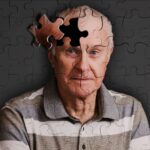
Fatigue, digestion, cancer, depression: can having your microbiota tested give us real answers?
April 11, 2024
An 82-year-old neurologist helps us differentiate between simple forgetfulness and the onset of Alzheimer’s
April 11, 2024Every day, it’s the same ritual. At 7 a.m. sharp, Élodie mechanically swallows this damn tablet. At 7:30 a.m., she is able to know if it is taking effect. If this is not the case, she swallows a second one. 8 a.m., no uncontrolled movements, little pain in the right hand: the day can begin, and quickly. “I think of myself as a cell phone battery. When I take my pill, I’m fully charged. I take advantage of this to do everything I have to do during the day before the effects diminish,” smiles the forty-year-old from Vienne (Isère). But first, the catheter must be changed to deliver a continuous flow of treatment throughout the day. “A nurse comes twice a day, but I also learned to change him on my own. » A well-worn day but far from being ordinary. Ten years ago, Élodie learned that she had an early form of Parkinson’s disease.
10 to 15% of patients suffer from an early form of Parkinson’s
In 2020, “177,624 people were treated for Parkinson’s disease in France”, according to data from Santé Publique France. That is approximately one person in 380. Among all of these patients, 15% are under 65 years old. The term “early form” of the neurogenerative disease is used when the patient is under 40-45 years old. This premature form of Parkinson’s only affects around 10 to 15% of patients according to Dr Teodor Danaila, neurologist at the Parkinson’s Expert Center of the Hospices Civils de Lyon. Less widespread, but above all little known, it confronts those affected with total surprise at the time of diagnosis.
“When I was told that I had Parkinson’s disease I laughed. For me, this could only concern elderly people, even very elderly people,” recalls Élodie. The day she noticed that she could no longer move her right hand, the thirty-year-old combed through all the possibilities: tendinitis, emotional shock… All, except Parkinson’s. “I had just undergone a completely benign operation, I initially thought that everything was linked,” she recalls.
In his mind, and in that of a large part of the population, Parkinson rhymes with tremors. A symptom that is, however, uncommon. “The disease is polymorphic. Some will experience loss of smell, constipation or very agitated dreams,” says Dr Danaila. “Women realize this more easily because they practice more fine gestures (like putting on makeup), and notice that the movement becomes exhausted. We also observe certain rigidity in the wrists, elbows, shoulders, etc. Movements are less fluid and less precise and this can cause pain. Finally, more rarely, it is possible to notice tremors. »
In her case, Élodie begins to “strum” with her right hand and is nicknamed “Parkinote” by her colleagues. A nickname that amuses him. During a consultation with his general practitioner, the latter wants to be reassuring but orders him an appointment with a neurologist “as a precaution”, without mentioning the illness. This same neurologist will advise her to go to a Parkinson’s specialist, again “to reassure” her patient. Six months after the first symptoms and two minutes after entering the office, the verdict is in.
“The earlier the disease begins, the slower it progresses”
“I received a heavy blow,” realizes the young woman who quickly understands that her life is definitively linked to this neuro-degenerative disease. Very quickly, she began a heavy treatment based on sixteen tablets per day. “It was very difficult to bear at the beginning, especially because of the side effects. I was very ill (nausea, fatigue and weight loss),” she explains. “In young patients, we face a more invasive form of the disease because there are professional and family issues that come into play,” analyzes Dr. Danaila. We therefore direct them to second-line treatments. These are medications for life, generally effective.” Currently, there is no treatment to stop the progression of the disease. But the professional reassures: “its development is not more serious in a young patient, it is even the opposite. The earlier the disease begins, the slower it progresses, and vice versa. »
“ Since the operation I live again »
It is this gentler development that allowed Élodie to have recourse to a deep brain simulation a year ago. This operation consists of “introducing two electrodes into the brain connected by cables passing under the skin to a battery”, explains Dr Danaila. A method known for around thirty years allowing neurostimulation. A better quality of post-operative life is observed in the patients concerned, as Élodie confirms.“ Since the operation, I have come back to life. I have much less dyskinesia (involuntary movements, Editor’s note).”
A change of life which not only allows him to breathe, but also to appear “less sick” in society. “People associate uncontrolled movements with taking drugs or alcohol, so much so that I have already been asked if I had drunk while I was at work,” confides the Parkinson’s sufferer. “My son once told me that his classmates asked him why I always shook my head no,” she continues.
But if the physical inconveniences have taken a back seat, Élodie remains very tired, loses her memory from time to time and has more and more difficulty planning her days and making herself understood. Three times a week, she goes to a speech therapist for articulation problems. A specialized sports coach also works at her home. She practices facial yoga to maintain regular physical activity, recommended to slow the progression of the disease.
Read also >> Parkinson’s disease: living with a sick partner for 25 years, she says
More and more cases to come
Despite her joy of life and her desire not to feel sorry for herself, the Viennese was fired for incapacity last September. “I loved my job but it was no longer possible because I was always standing and I had to use my hands,” explains the former perfumery employee.
To this day, Élodie does not know the origin of her illness. Often, symptoms can appear after several years of silence. “There are individual predisposing factors that we have little control over,” says Dr. Danaila, who confirms that it is very difficult to determine the origin of this disease in a patient. One thing is certain: The number of cases has increased over the past twenty years and will certainly continue over the next two decades. Several hypotheses are mentioned in the field of neurology. One highlights “an increasing use of pesticides and fine particle pollution,” says the specialist. “Not only are we seeing patients affected earlier and earlier, but there are also more and more cases of the disease in general. » The youngest Parkinson’s patient that Dr. Danaila met was 20 years old at the time of diagnosis.

